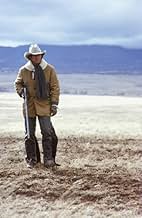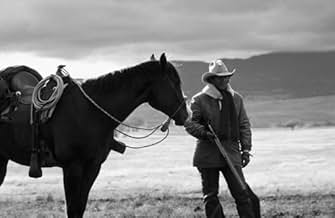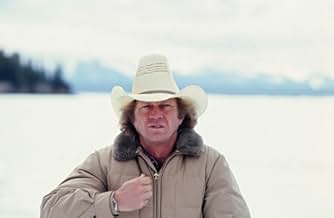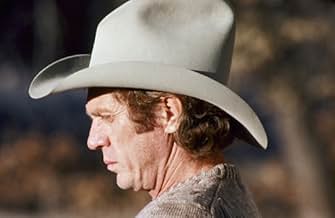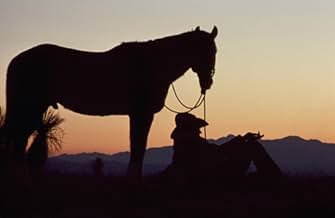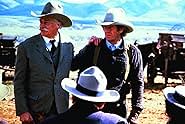Tom Horn
- 1980
- Tous publics
- 1h 38min
NOTE IMDb
6,8/10
6,4 k
MA NOTE
Un ancien éclaireur de l'armée est engagé par des éleveurs pour tuer des voleurs de bétail, mais il a des ennuis avec les fonctionnaires locaux corrompus lorsqu'il tue un garçon.Un ancien éclaireur de l'armée est engagé par des éleveurs pour tuer des voleurs de bétail, mais il a des ennuis avec les fonctionnaires locaux corrompus lorsqu'il tue un garçon.Un ancien éclaireur de l'armée est engagé par des éleveurs pour tuer des voleurs de bétail, mais il a des ennuis avec les fonctionnaires locaux corrompus lorsqu'il tue un garçon.
- Réalisation
- Scénario
- Casting principal
Elisha Cook Jr.
- Stablehand
- (as Elisha Cook)
Avis à la une
Tom Horn is directed by William Wiard and adapted to screenplay by Thomas McGuane and Bud Schrake from Horn's own autobiography. It stars Steve McQueen, Linda Evans, Richard Farnsworth, Billy Green Bush and Slim Pickens. Music is by Ernest Gold and cinematography by John A. Alonzo.
Plot finds McQueen as legendary army tracker - turned hired gun - Tom Horn, who is hired by Wyoming ranchers to see off cattle rustlers, only to see them turn against him when his methods threaten their reputation.
As a big fan of both Westerns as a genre and McQueen (in the process of getting the cancer that would kill him) the actor, it's tricky trying to review Tom Horn (and his final film "The Hunter") without the heart ruling the head. Fact is, is that Tom Horn is not the glorious hard hitting Tom Horn picture that the character demands. It looks fabulous, is very melancholic, and McQueen is genuinely affecting in his performance, but the production problems (various attached directors, rewrites etc) are evident and give us a film of what might have been.
Nonetheless, this is no stinker, in fact, it's a very reflective piece dealing with a man out of his time - and he knows it. The narrative is strong on the end of the so called Wild West, a changing of the times, where law and order is about to finally become the dominant force. Horn was the man who helped bring in the mighty Geronimo, which gives the makers a chance to not only nod towards respect for the great Apache chief as a plot device, but to also let Horn, in McQueen's hands, show us a resignation of time being up for his kind.
One dodgy "special effect" aside, when the violence is required for the story it is an adrenaline jolt, this is because the tone of the piece is ultimately sombre. The hazy romantic thread between Horn and Glendolene Kimmel (Evans is fine in a thankless role) is suffering from flashback overkill, but the tender feel to it sits comfortably within the pic's earnest intention. The political aspects strike the required chord for narrative worth, and the key aspect of Horn's ultimate fate being based on fact or otherwise? is deftly handled.
Poor editing and a number of "time filling shots" grate a little, and if not prepared for a sombre pic then this will disappoint. Yet there's a lot of beauty here and if you be a fan of McQueen or not, his turn is brave, committed and very engaging. 7/10
Plot finds McQueen as legendary army tracker - turned hired gun - Tom Horn, who is hired by Wyoming ranchers to see off cattle rustlers, only to see them turn against him when his methods threaten their reputation.
As a big fan of both Westerns as a genre and McQueen (in the process of getting the cancer that would kill him) the actor, it's tricky trying to review Tom Horn (and his final film "The Hunter") without the heart ruling the head. Fact is, is that Tom Horn is not the glorious hard hitting Tom Horn picture that the character demands. It looks fabulous, is very melancholic, and McQueen is genuinely affecting in his performance, but the production problems (various attached directors, rewrites etc) are evident and give us a film of what might have been.
Nonetheless, this is no stinker, in fact, it's a very reflective piece dealing with a man out of his time - and he knows it. The narrative is strong on the end of the so called Wild West, a changing of the times, where law and order is about to finally become the dominant force. Horn was the man who helped bring in the mighty Geronimo, which gives the makers a chance to not only nod towards respect for the great Apache chief as a plot device, but to also let Horn, in McQueen's hands, show us a resignation of time being up for his kind.
One dodgy "special effect" aside, when the violence is required for the story it is an adrenaline jolt, this is because the tone of the piece is ultimately sombre. The hazy romantic thread between Horn and Glendolene Kimmel (Evans is fine in a thankless role) is suffering from flashback overkill, but the tender feel to it sits comfortably within the pic's earnest intention. The political aspects strike the required chord for narrative worth, and the key aspect of Horn's ultimate fate being based on fact or otherwise? is deftly handled.
Poor editing and a number of "time filling shots" grate a little, and if not prepared for a sombre pic then this will disappoint. Yet there's a lot of beauty here and if you be a fan of McQueen or not, his turn is brave, committed and very engaging. 7/10
The film is distinctive in four ways, the first being that Steve McQueen finally returned to the screen after having spent the 1970s elsewhere. He was a bounty hunter in the late 1950s on television, then jumped to prominence in "The Magnificent Seven" about 1960 and spent the next ten years as a dominant force on-screen. So this film was a "comeback." But McQueen came back as an artist, not as a cartoon version of his earlier self. His portrayal of Tom Horn does not use close-ups, quick draws or choreographed violence. The second thing that stands out here is the subject of the film, which is frontier justice on the high plains, a rough subject to be sure. "Tom Horn" (1980) is the first movie since "Shane" (1953) to deal realistically with the subject a part of which treatment is using the countryside itself as a character. There were a lot of movies beginning in the late 1960s with Clint Eastwood's "spaghetti westerns" which focused on the grisly righteousness of law enforcement, but it wasn't until Eastwood's "Unforgiven" (1998) that he finally made a movie that approached the quality of "Shane" and "Tom Horn," and employed some panoramic camera work. Third, the way the story is told is unfamiliar to most modern movie fans because it is so old, traditional and specific to the northern plains. The story is told, by veteran Western director Wiard, in the same way author Albert White Eagle tells stories, as a montage of contrasting fragments often out of chrnonolgical order -- "oh, by the way, I forget to tell you something, let me tack it on now" -- the juxtaposition of which fragments imply the surreal ambience of the times, an ambience which could not be effectively shown using the usual plot devices, cinematic close-ups, narrative summaries and chronological markers. For example, we see Tom in a jail cell looking at the clouds outside the little window, then we see him, with the same clouds in the sky behind him, shooting a young man (uncredited actor Sonny Skyhawk) who tries to kill the school marm as she bathes in the horse trough while talking with Tom. Is this something that really happened before he was locked up, or is it a fantasy or dream born of incarceration? It doesn't matter whether the scene is real or imagined, what matters is the jolt we receive by seeing it out of sequence. Most directors would have either shown Tom going to sleep in the cell, thus implying the scene was a dream, or would have had some narrative dialogue which indicated that Tom was remembering something that had really transpired. But Wiard, throughout the film, uses that northern technique. Another example is when we are visually escorted out of a scene in which Tom kills a rustler, with beautiful mountains in the background, into one where he is breaking a horse for the schoolmarm to eventually ride -- the same mountains are in the background, unchanged. A final thing about this movie was actor Richard Farnsworth. This was the first movie in which he had considerable dialogue, and was given a chance to demonstrate his skill at characterization. He plays John Coble, Tom Horn's employer. At the end of the movie is a 1904 quote from Coble, saying that that Tom was not guilty of the crime of which he was accused and convicted. This quotation, as Western researchers know, is from Coble's suicide note. And it foreshadowed Farnsworth's sucide twenty-two years later, a few months after being nominated, finally, for an Academy Award for his brilliant portrayal in "The Straight Story." McQueen, on-screen, and Farnsworth, on-screen and off, epitomized that quality of the Westerner least understood by people in the rest of the nation. The real Tom Horn said, "The people in the Northeast hire us to protect them from the people in the South," and, "We find the thing, whatever it is, then somebody else gets the glory for bringing it down, and somebody else makes the money for taking it back to the folks in town," but "You can either laugh or cry at your fate, and that's not much of a choice, is it, pardner?" The droll stocism and sardonic wit of the cowboy, and the western tracker whether white or Indian, has always enchanted and mystified the rest of the nation, and never really been understood. The movie, "Tom Horn," is a fitting tribute to the history and people of the northern plains, to Steve McQueen's artistry, to the memory of Richard Farnsworth, and to stories that are not easy to tell.
w. t. benda
w. t. benda
Directed by William Wiard and based on a true story, "Tom Horn" opens in 1901, in Wyoming, where McQueen meets John C. Coble (Richard Farnsworth) who offered him to ease up at his place for a while
Tom accepted, but he said I'd to earn my keep
Seeing Horn with great ability with a rifle, and after speaking with the Association, John asks him to eliminate the rustlers who have completely wiped out their herd profits not to mention what the buzzards and the predators have done to their cash crops
But after one incident has disturbed the Association in town, and the rustling has stopped, they determined to get rid of Horn forgetting he was only doing what they hired him to do Mc Queen plays well the Indian tracker "scared to death of lobster, the man of the West "afraid to lose his freedom and not be able to get back up in those hills again."
Linda Evans is appealing as the school teacher from Hawaii who saw a man of the Old West trying to live in the New
Richard Farnsworth is the loyal friend John C. Coble who was quite sure that Tom never killed that kid John advices him not to try to break out of the jail He knows he can do it, but it's just admitting his guilt if he tries
Billy Green Bush is the U.S. Marshal Joe Belle who asks the newspaperman to sit behind the door and write lying down what he hears real good
Slims Pickens is the old Sheriff Sam Creed who arrested Tom
With a legendary hero, great photography and good direction "Tom Horn" is very good Western to watch
Seeing Horn with great ability with a rifle, and after speaking with the Association, John asks him to eliminate the rustlers who have completely wiped out their herd profits not to mention what the buzzards and the predators have done to their cash crops
But after one incident has disturbed the Association in town, and the rustling has stopped, they determined to get rid of Horn forgetting he was only doing what they hired him to do Mc Queen plays well the Indian tracker "scared to death of lobster, the man of the West "afraid to lose his freedom and not be able to get back up in those hills again."
Linda Evans is appealing as the school teacher from Hawaii who saw a man of the Old West trying to live in the New
Richard Farnsworth is the loyal friend John C. Coble who was quite sure that Tom never killed that kid John advices him not to try to break out of the jail He knows he can do it, but it's just admitting his guilt if he tries
Billy Green Bush is the U.S. Marshal Joe Belle who asks the newspaperman to sit behind the door and write lying down what he hears real good
Slims Pickens is the old Sheriff Sam Creed who arrested Tom
With a legendary hero, great photography and good direction "Tom Horn" is very good Western to watch
I often wonder how pre video audiences were able to take in the full effect and minor nuances of films as we can today. Watching a film again and again allows one to really study the work and pick up the director's deep intent for character and plot.
Watching Tom Horn a few times allows one to see that it really is a good movie. And after more than 20 years in motion pictures, McQueen finally just fits into his role, and does not "act" or play Steve McQueen.
The first scenes are excellent. McQueen establishes his character as a man who knows, and has seen most of, what the west is about. He knows who he is, and what he's accomplished, so he doesn't need to brag. The way he virtually walks into a fight in the bar with the pompous British fighter and his manager is superb. "Well, if he ain't won the fight yet, then he ain't the champ yet" is delivered with believable aplomb. When he says the guy's mother would have to stand on his shoulders just to kiss Geronimo's ass it is priceless. Especially good is his question "OK, if I win this fight, then does that make ME champion of the world?" He knows he is going to get his butt kicked but does all this for principle's sake. His running out the door and yelling oh s***, then throwing the plate of food at the fighter is one of the better acting sequences done anywhere.
His work as the stock detective is classic McQueen without his earlier years of mugging and panning. Good stuff.
The open spaces of this film, and Horn's subsequent incarceration gave me a feeling of freedom and claustrophobia. It worked well
Watching Tom Horn a few times allows one to see that it really is a good movie. And after more than 20 years in motion pictures, McQueen finally just fits into his role, and does not "act" or play Steve McQueen.
The first scenes are excellent. McQueen establishes his character as a man who knows, and has seen most of, what the west is about. He knows who he is, and what he's accomplished, so he doesn't need to brag. The way he virtually walks into a fight in the bar with the pompous British fighter and his manager is superb. "Well, if he ain't won the fight yet, then he ain't the champ yet" is delivered with believable aplomb. When he says the guy's mother would have to stand on his shoulders just to kiss Geronimo's ass it is priceless. Especially good is his question "OK, if I win this fight, then does that make ME champion of the world?" He knows he is going to get his butt kicked but does all this for principle's sake. His running out the door and yelling oh s***, then throwing the plate of food at the fighter is one of the better acting sequences done anywhere.
His work as the stock detective is classic McQueen without his earlier years of mugging and panning. Good stuff.
The open spaces of this film, and Horn's subsequent incarceration gave me a feeling of freedom and claustrophobia. It worked well
My wife thinks this movie is a dirty portrayal of the West. Historians will argue about Horn and the events that happen in this film, but I like it. Do not watch the edited tv version, to get the real brutal feel of this film rent it. It is a good portrayal of how dirty and nasty the frontier really was. The end suits this film very well, and if my wife can watch an entire Western the film is well done.
Le saviez-vous
- AnecdotesFilmed at the beginning of 1979, Steve McQueen was already very ill with cancer. He had difficulty breathing, and began coughing up blood towards the end of filming, but assumed he had pneumonia.
- GaffesIn the opening sequence, the wording says, "In 1901 he drifted into Wyoming 'Territory'". Wyoming had been a state since 1890.
- Citations
U.S. Marshal Joe Belle: Do you know who I am?
Tom Horn: No.
U.S. Marshal Joe Belle: What you were in the Southwest, I was in the Northwest.
Tom Horn: I was mostly out of work.
- Versions alternativesUK cinema and video versions were cut by 39 secs by the BBFC to remove a horse-fall and to edit a scene of a man's head being blasted during a gunfight. The 2006 DVD release restores some cuts and is only missing 6 secs of the horse-fall.
- ConnexionsFeatured in Steve McQueen: The Essence of Cool (2005)
Meilleurs choix
Connectez-vous pour évaluer et suivre la liste de favoris afin de recevoir des recommandations personnalisées
- How long is Tom Horn?Alimenté par Alexa
Détails
Box-office
- Budget
- 3 000 000 $US (estimé)
- Durée
- 1h 38min(98 min)
- Mixage
- Rapport de forme
- 2.39 : 1
Contribuer à cette page
Suggérer une modification ou ajouter du contenu manquant


